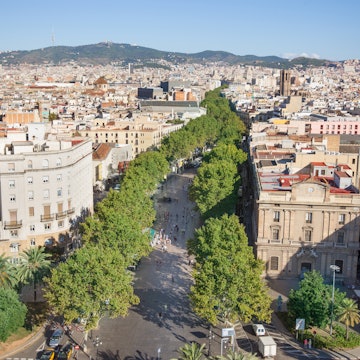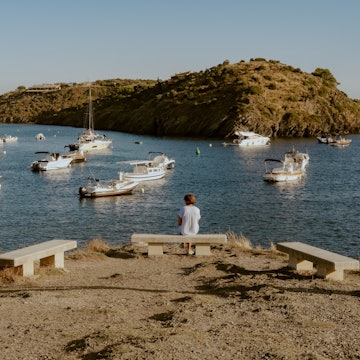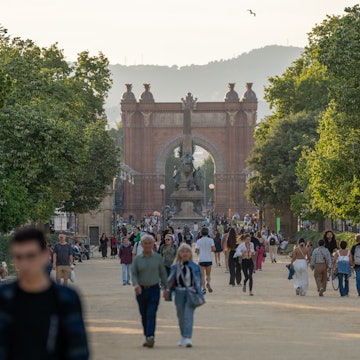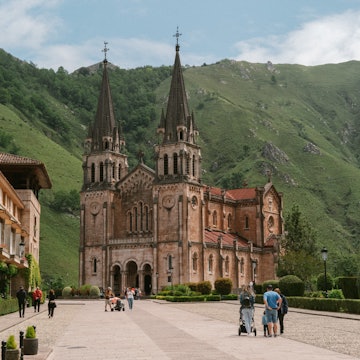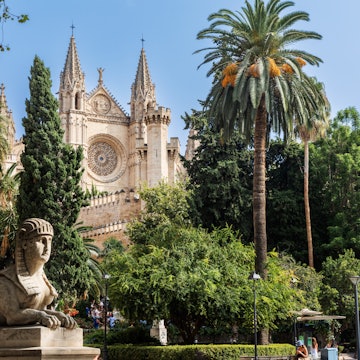

Whether you're here for the sand or the nightlife, here's what you need to know for a first trip to Ibiza © courtneyk / Getty Images
Not sure if Ibiza is for you? Rest easy – it is! Ibiza is a clubber’s paradise. Ibiza is a family getaway. Ibiza is full of beautiful people in designer gear. Ibiza is home to hippy markets and yoga retreats. Ibiza has towns full of heaving bars and pounding music. Ibiza is a lush, green island full of outdoor activities to enjoy.
Now that we've established that Ibiza is definitely for you, read on to find out how to make the most out of this gorgeous Balearic island for your own holiday.
When is the best time to go to Ibiza?
Clubs in Ibiza generally start to open sometime in May or June but more and more nightspots emerge as time goes on. Hardcore clubbers who want the biggest selection of parties every night should aim to be here in July or August when the calendar is busiest.
Since club nights don’t really kick off until at least midnight, you’ll escape the heat even in peak summer. Closing party season from September and October can be a lot more chilled; if you have a particular DJ or club night in mind, it could be well worth planning a trip for the end of the season.
Lovers of the outdoors, travelers going on wellness retreats and anyone looking for a trip that isn't tied to the islands’ club schedule should consider coming when the clubs are closed (November to April). Not only will your break be much cheaper and quieter, but the island is a lot greener and the weather is more amenable to strenuous activities such as hiking. You’ll also get to experience a lot more local life on the island.

How long do I need for Ibiza?
With regular connections from most European countries, visiting Ibiza for a long weekend is possible for most people. And the time you spend flying here is offset somewhat by the small size of the island's international airport and the ease of getting a taxi and traveling around the island after you arrive.
To get the most out of the chill factor of the island, consider staying at least a week. Allow plenty of time to lounge on the beach or by the pool, enjoy leisurely beachside dinners, and fit in some exploration of the island’s hidden coves and the secluded northern coast.
Stay a little longer and you’ll have plenty of time to explore the dreamy island of Formentera and bake in a mix of clubbing nights and recovery days into your itinerary. Or spend days exploring markets and boutiques and take your time finding your perfect sunset spot.
Is it easy to get to Ibiza and travel around?
Ibiza’s small airport is served by numerous air routes, particularly from Spain and the UK. For a more sustainable, slow travel experience, you can take a ferry from Barcelona or Valencia year-round. Local ferries connect to other Balearic Islands that sit waiting to be explored.
The buses that connect the major towns of the island are by far the cheapest way to get around. Fares depend on the distance you travel but start from €1.50. The party-oriented DiscoBus connects the resort towns of San Antonio and Playa d'en Bossa with the major clubs, running all night throughout the season.
Taxis are usually easy to find (except after the clubs close, when you might need to wait) but the fares can rack up if you’re crisscrossing the island a lot. Your accommodation should be able to call you a cab or you can use the "Taxi Ibiza" app. Uber is not available in Ibiza (or any of the Balearic Islands).
Cycling is becoming more popular in Ibiza, but there are plenty of hills, particularly in the north of the island, so plan accordingly. No matter how you do it, having your own set of wheels will allow you to discover a lot more of the quieter side of the island.

Top things to do in Ibiza
With so much variety on the island, you could spend a long time exploring the best that Ibiza has to offer. For those on a tight schedule though, here are the highlights.
Catch some beats
Ibiza is famous for its energetic dance music and you can’t leave without sampling it in some form. The website Ibiza Spotlight has the definitive party schedule; it's an expert voice on the kind of vibe you'll find in the different clubs, as well as other big nights out such as boat parties.
Always book ahead for the big club nights; it’s cheaper than paying on the door. As a quick rule of thumb, Ushuaïa has the most mainstream dance music names, Amnesia and Pacha are iconic venues hosting an eclectic mix of DJs, and DC10 is for hardcore dance fans.
If you’re traveling as a family or just want some chillout time, there are plenty of excellent DJs playing from midday onwards at beach clubs and restaurants, so you can enjoy the quintessential Ibiza sound even while relaxing. Watching the sunset at or near Café del Mar in San Antonio while listening to laid-back Balearic beats is a bit of an Ibiza cliché, but it’s worth making the trip at least once if you can for the atmosphere.
Dive into Ibiza’s alternative side
If we had to reduce Ibiza to an island of two halves, one would be music and the other would be the island's bohemian spirit. Ibiza has long attracted hippy types and this is reflected in two famous and long-standing hippy markets in Las Dalias and Punta Arabí.
Yoga is a staple offering everywhere on the island – indeed, both of the hotels I stayed in, Hotel Riomar and Casa Munich, offered free classes to their guests. Glamping is also becoming increasingly popular as an almost-budget accommodation option.
But as with everything on the island, there are plenty of options for a splurge. Ibiza is the setting for a vast array of retreats, where you can spend the days enjoying everything from yoga, nature walks and horse-riding to healthy eating, fitness boot camps and energy workouts. I tried out forest bathing in Ses Salines Nature Park with Jana at Yoga Balance Ibiza, who also runs guided hikes and yoga classes.

Beach-side dining
Running the full spectrum from rustic market produce to swanky restaurants with experimental fusion menus, the Ibiza dining scene has everything. Best of all, it’s easy to chow down with an incredible sea view, no matter what your budget.
Koba and Um Beach House were just two of the restaurants that I sampled in Santa Eularia, but you’ll find beach clubs with excellent restaurants anywhere on the coast, from the Experimental Beach in the lightly developed Cap d'es Falcó near Parc Natural de ses Salines to the famous El Bigotes in the north-west (where you need to clamber over rocks if you’re going on foot). For something a litle more sheltered, try the excellent poolside dining at Ibiza Town's Izakaya, who specialise in inventive Asian fusion.
Where to stay in Ibiza
A big part of choosing your own adventure in Ibiza will be deciding which part of the island to stay in, as this will also determine the vibe of your holiday.
Ibiza Town is the best spot for first-timers for an all-round Ibiza experience. The town is picturesque, with white cobblestone streets and the Balearics’ trademark pink bougainvillea flowers trailing down from the buildings. It also has the best selection of restaurants and plenty of buzzing bars, though it's far enough from the big clubs that the main part of the town doesn’t get too rowdy. Pacha is the nearest big nightspot and it's within walking distance.
Ibiza Town is also within easy reach of the beach strip at Playa d'en Bossa, which has great sand and more of a party atmosphere. There are plenty of places to stay in Playa d'en Bossa as well if you’re going on a party holiday but want a more laidback vibe than you'll find in boisterous San Antonio on the eastern side of the island.
For something that feels far more remote, consider staying on the west coast, in or near Parc Natural de ses Salines. This area feels a world away from the ritzier towns on the island and is popular for walking and bird-watching, but you can still find hidden beach clubs as you wander the coast.
I stayed at Casa Munich, which boasts three pools and good yoga and wellness facilities and feels like a secluded bubble, but is still within easy cycling distance of Playa d'en Bossa. DC10, the hardcore clubber’s venue of choice, is the closest club. It’s also a good spot for a short break as the airport is just a few minutes away by taxi.
Families or anyone in need of peace and quiet should consider Santa Eulalia for a break. This is truly the other side of Ibiza, with a quiet town and promenade, but it's still fairly close to the airport and within easy reach of the famous hippy market in Las Dalias.
I stayed in Hotel Riomar, which offers gorgeous sea views and activities such as yoga but also has music in the afternoon and evenings either on their pool deck or in their outdoor dining area (non-residents can book in for meals and enjoy the view).
On the east side of the island, San Antonio (Sant Antoni de Portmany) is the big party town, with frantic energy. It's home to super clubs such as Es Paradis and Eden, and it's the starting point for many boat parties. Even if you’re not a clubber, it’s worth venturing here for the famous sunsets. Exploring the beaches and coves of San Antonio Bay is also highly rewarding.

How much money do I need for Ibiza?
Ibiza is one of the more expensive destinations in Spain. There are loads of upmarket restaurants and luxury boutiques where you can fritter your money away, and club nights (both tickets and drinks) can be very expensive. If you avoid both of these though, you can enjoy a reasonable mid-budget break, though you’ll have to be very careful and limit the indulgences if you’re traveling on a very strict budget.
Average prices are a little hard to pin down in Ibiza as there is often no limit to what you can spend, especially on food and drink. Here are some average ranges as a starting guide.
Hostel room: €50–150
Basic room for two: €140–350
Self-catering apartment (including Airbnb): €90–180
Bus ticket: €1.55–4.00
Coffee: €2.20
Sandwich: €5–15
Dinner for two: €30–200
Beer at the bar: €3–6
Club night ticket: €30–80
Water at a club: €6–13
Beer at a club: €10–14
Can I drink the tap water?
Always ask your accommodation if the tap water is potable (and be aware that even if it is, it may taste bad). Keep an eye out for public drinking fountains or water refilling stations. Water is generally scarce on the island and there’s a huge push to conserve water throughout the year so please be mindful of your overall consumption.
There’s one area where you shouldn’t skimp on the H2O; always factor in the water costs when you hit the clubs. Contrary to some online myths, clubs are not legally required to provide you with drinking water (though bars and restaurants are) and they will charge you accordingly. Grimace and pay up anyway: it’s essential to keep hydrated if dancing the night away in hot, crowded spaces.
AnneMarie visited Ibiza on the invitation of We Are Indigo. Lonely Planet contributors do not accept freebies in return for positive coverage.
Take your Spain trip with Lonely Planet Journeys
Time to book that trip to Spain
Lonely Planet Journeys takes you there with fully customizable trips to top destinations – all crafted by our local experts.


















